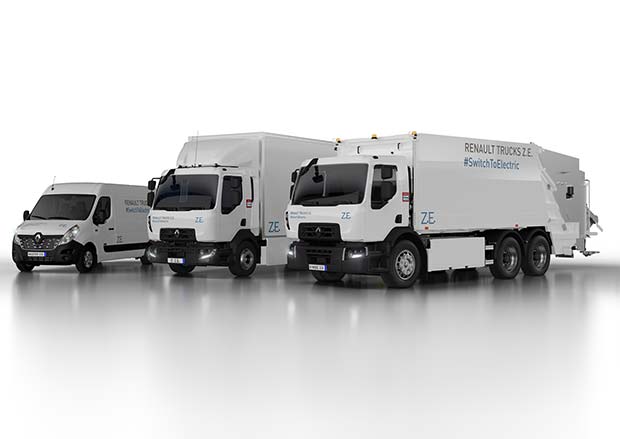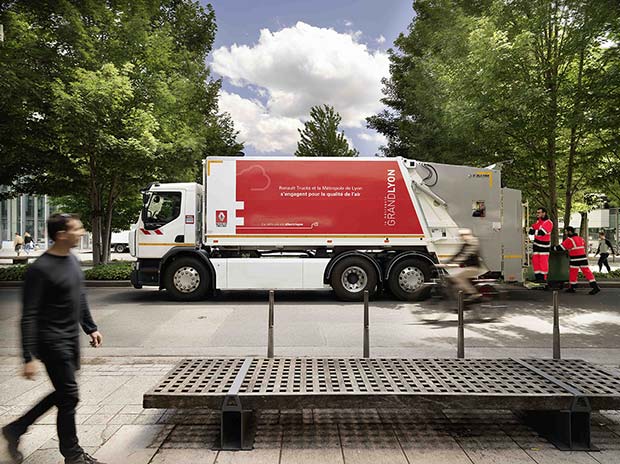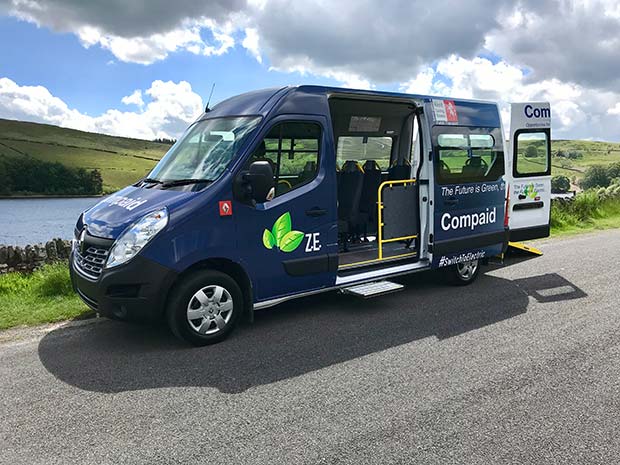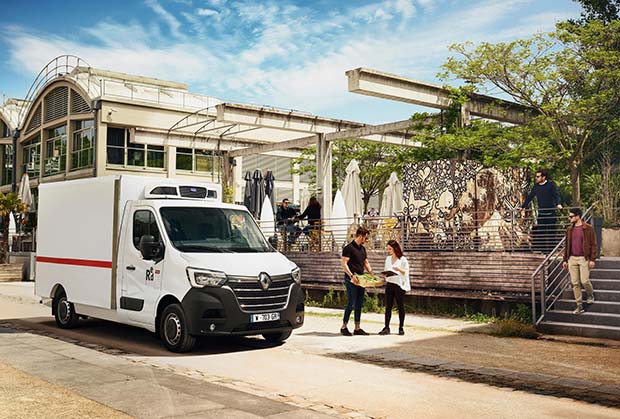Our towns and cities have struggled for years with urban air quality and noise issues caused by internal combustion engines. As a leading commercial vehicle manufacturer, Renault Trucks sees electromobility as the obvious response, and has been preparing for the shift to electric vehicles in urban settings for over ten years.

With the arrival of the manufacturer’s latest generation of all-electric vehicles, Renault is realising its vision to be a driving force in the electromobility revolution in the commercial sector.

Carlos Rodrigues, Managing Director of Renault Trucks UK & Ireland, spoke to Warehouse & Logistics News.
Warehouse & Logistics News – What does your role as MD of Renault Trucks UK & Ireland involve day to day?
Driving the business forward is my day-to-day responsibility. Ensuring we work closely with our network is a key task. I need to make sure Renault Trucks, with its network partners, supports our customers to be successful in their day-to-day operations. I also make sure our teams are motivated: happy employees serve better customers. Finally, it is my responsibility to deliver the ambitions that we have set for the Renault Trucks brand in the UK and Ireland.
WLN – Please can you talk us through your new electric commercial vehicles?
The all-electric Renault Trucks Z.E. range spans 3.1 tonnes to 26 tonnes GVW. The Master Z.E. is already in service and available to order in van and platform cab variants, as well as from our Ready for Business prebodied range. Range D Z.E. and D Wide Z.E. medium duty models will be available in September and we have started conversations with various operators regarding their specific needs. Medium duty deliveries will commence in early 2020.

WLN – What different applications are they suited to? What payloads do they cover?
Each model has different capabilities, meeting different needs. Which versions of our electric range we introduce most quickly depends on our customers. Our conversations so far suggest operators are very open and flexible in considering how electric vehicles can be utilised most effectively, giving us the opportunity to be innovative in our approach to specifying these vehicles. For example, the first Master Z.E. has now entered service – not for last mile deliveries as we might have expected, but as a minibus, providing accessible and sustainable transport to disabled and older people in Kent. Master Z.E. is now available in multiple applications with a 3.1t GVW – it’s much more than just parcel deliveries! This GVW will rise after further engineering changes as the new Master Red EDITION is introduced in the Autumn.

For our medium duty models, we anticipate the waste sector will be early adopters, even though this represents a particularly demanding set of engineering challenges. Renault Trucks’ first D Wide Z.E. model is working in Lyon as a refuse vehicle, and several municipal authorities and waste companies are keen to trial electric RCVs. Renault Trucks’ D Wide Z.E. refuse vehicle operates at GVW of 26t and a payload of around 11t. Other operators are keen to improve their environmental performance, and conversations are happening for D Z.E. models, operating at weights between 16t and 26t, with operators in sectors with a very high environmental profile, and distribution companies keen to establish new business models servicing locations where customers demand zero tailpipe emissions.

Payload depends on application and body specification, but will be between 7t and 7.5t for dry goods.
WLN – What different versions are there? What top speeds do they have? What real life range do they have?
Our ambition is to offer the widest possible range of vehicles in line with customer demand. The Renault Trucks Master Z.E. van comes in three wheelbases, L1 (SWB), L2 (MWB) and L3 (LWB) and two roof heights, standard and H2, medium high. The platform cab comes in L2 and L3 variants. Top speeds are generally limited to 100kph although we offer speeds of 90 and 80kph as an option. Real life range is highly dependent on factors including weather, topography, driving style and weight of operation, however in real life testing, 75 to 100 miles per charge on varied use including all types of roads is achievable but more importantly, in urban use, the Z.E. motor’s regenerative nature is so good, operators can increase their mileages simply by driving in the best way possible.
Range D Wide Z.E. is offered with a 3900mm wheelbase and 200kWh battery packs; Range D Z.E. is available in 4400mm and 5300mm wheelbases – with 200kWh or 300kWh battery configurations respectively. All come with two-speed gearboxes, configured for take-off (with equivalent wheel torque to a diesel model) and cruising. Operating range depends on vehicle specification, application and other factors: we expect ‘typical’ dry distribution applications to achieve 200km for models with 200kWh batteries and 300km for 300kWh batteries. All models are compatible with fast charging, allowing double-shifting.
WLN – Electric vehicles are much quieter than IC engine vehicles. Do you see any difficulties with your electric vehicles being too quiet for pedestrians to hear?
As with cars, the experience of an electric truck for operators and other road users is significantly different to a diesel. We are confident the vehicles’ quietness will be appreciated by most people, and the quietness of the Master Z.E. minibus is one of the significant attractions to Kent County Council, particularly for hearingimpaired users. All Master Z.E. models are specified with ‘Z.E. Voice,’ providing an audible alert below 20km/h.
WLN – What connectivity (Internet of Things) do the new vehicles have?
Connectivity is a huge opportunity for electric vehicles, and the use of data will continue to develop.
Alongside our on-board diagnostics and vehicle/body interfaces, we are also working with expert partners to consider how their expertise can further enhance the operational efficiency of our electric vehicles.
WLN – Will these new vans and trucks be available through your UK dealer network? When will they be available?
In the first instance, dealers with experience in electric vehicles and those in south-east England have been first to invest in the capability to supply and service Renault Trucks’ electric range. Others will continue to respond to local demands and can move to electric at a few months’ notice.
WLN – Will you be offering them on contract hire?
We expect a high proportion of sales through contract hire and Renault Trucks Financial Services can offer a range of finance options to potential purchasers.
WLN – What are the new electric trucks like in terms of maintenance requirements? What service contracts are you offering?
It is expected that maintenance requirements will be lower for an electric vehicle as there are far fewer moving parts, and this will be factored into maintenance agreements. As our dealers will be the experts in maintaining our electric vehicles, it is expected that service contracts will be taken out by all the early EV adopters.
WLN – Will you be offering VANTELLIGENCE On Board telematics with your Master Z.E.?
Yes, our fleet management tools – VANTELLIGENCE for LCV and OPTIFLEET for HGV – are integral to helping customers’ day-to-day operations, reducing operating costs and assisting with compliance. They are available across our Z.E. range.
WLN – Presumably you will still continue making Renault with IC engines for the foreseeable future?
The IC engine continues to demonstrate the benefits of 100 years’ investment so is expected to continue in-service for many years to come, particularly in the long haul sector, where it will take longer to change the operating and economics models.
Renault Trucks will continue to innovate and invest with our partners in alternative technologies and operational models to ensure our trucks meet the demands made by all stakeholder groups as efficiently and effectively as possible.
WLN – What’s the best way for interested readers to find out more about Renault Trucks?
Our website, renault-trucks.co.uk is a good starting point for news and product information, but the best resource is your local Renault Trucks dealer.
WLN – Looking ahead, where do you see Renault Trucks’ logistics sector offering going from here?
We are in conversation with various logistics operators to explore new business models which make best use of the evolving electric technology.
But it’s not just logistics – the wider transport sector, the construction sector and specialist vehicle operators are all keen to exploit the electric vehicles opportunity. Renault Trucks’ challenge is to create innovative solutions with our customers and bodybuilder partners giving the greatest impact in the shortest timeframe.
www.renault-trucks.co.uk | 0870 60 60 660 | UKinfo@renault-trucks.com




Comments are closed.